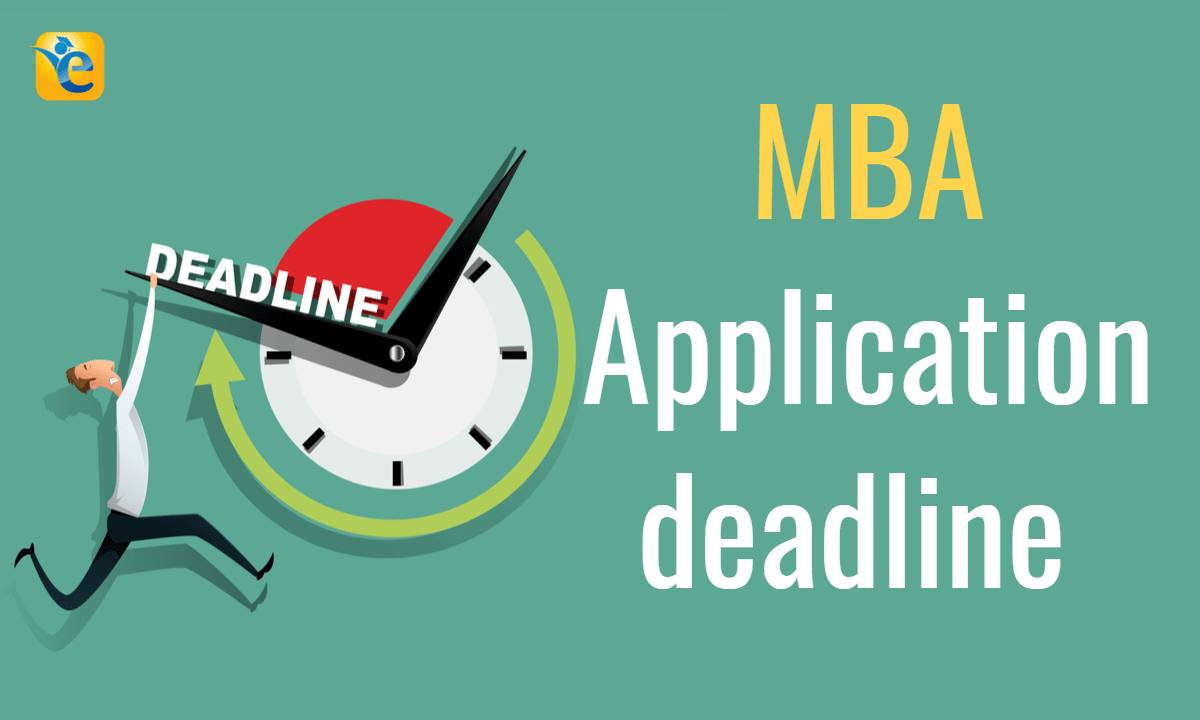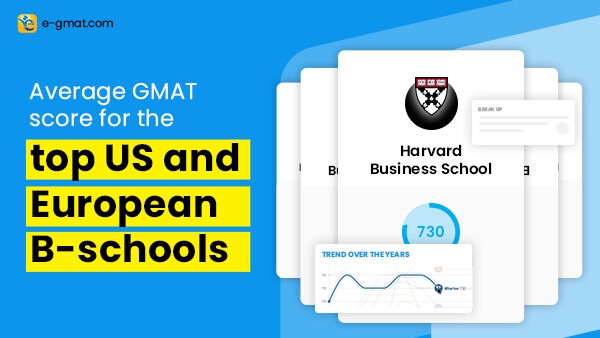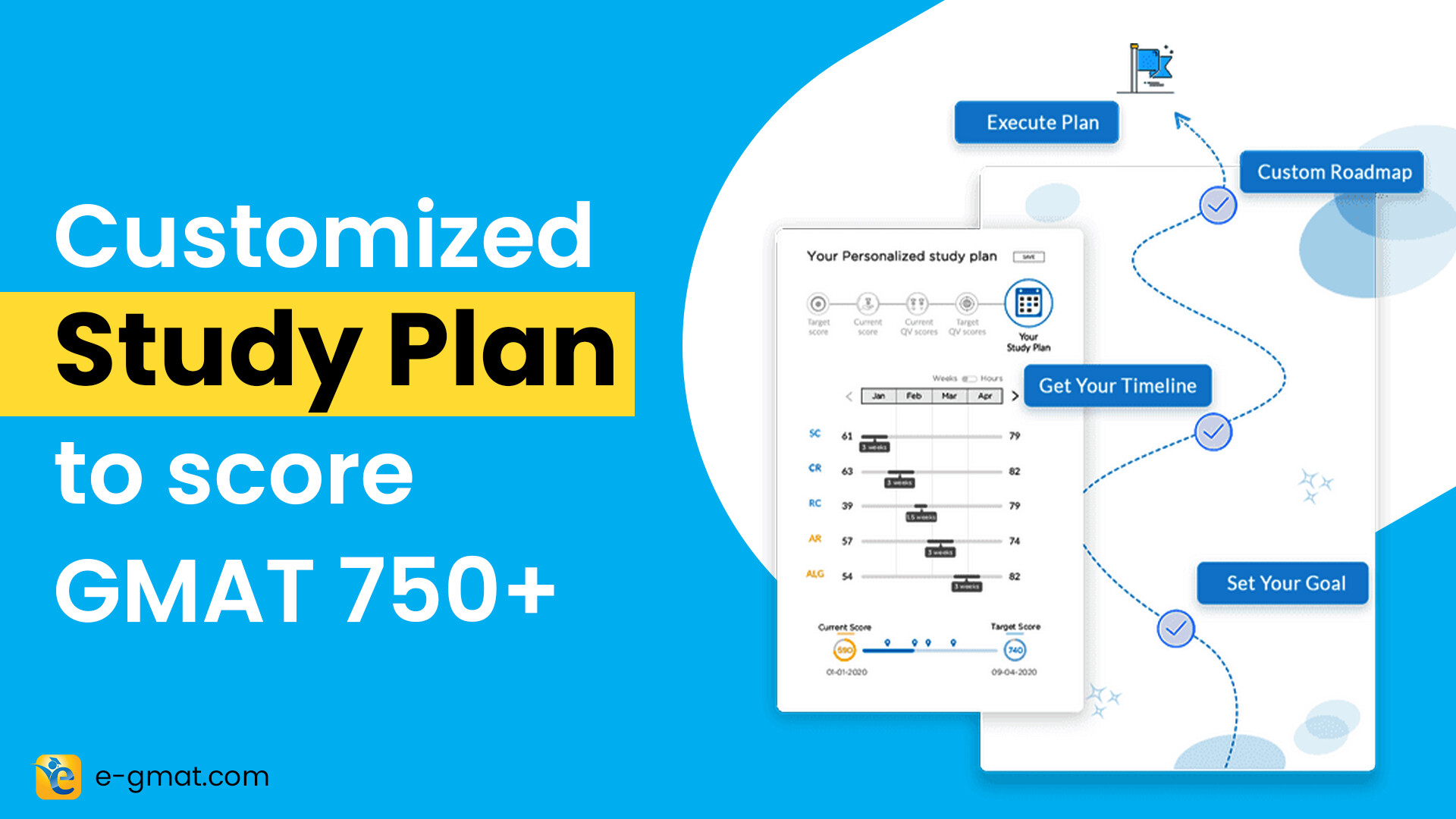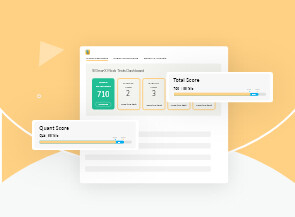Missing a single MBA admissions deadline could cost you an entire year of career advancement and $200,000+ in potential earnings. Strategic timing in the MBA admission process isn’t just about avoiding missed deadlines—it’s about positioning your application for maximum impact.
Each top business school has different MBA admissions deadlines, and applying in the wrong round can significantly reduce your chances of admission.
This comprehensive guide gives you everything you need in one place: complete deadlines for 50+ global MBA programs, round-by-round strategic advice, and a timeline to keep your applications on track.
For any strategic advice for GMAT or MBA Admissions, write to us at acethegmat@e-gmat.com. Let us help you conquer the first step of getting into top business schools i.e., taking the GMAT. Take a free GMAT mock to understand your baseline score and start your GMAT prep with our free trial. We are the most reviewed online GMAT Prep company with 2600+ reviews on GMATClub
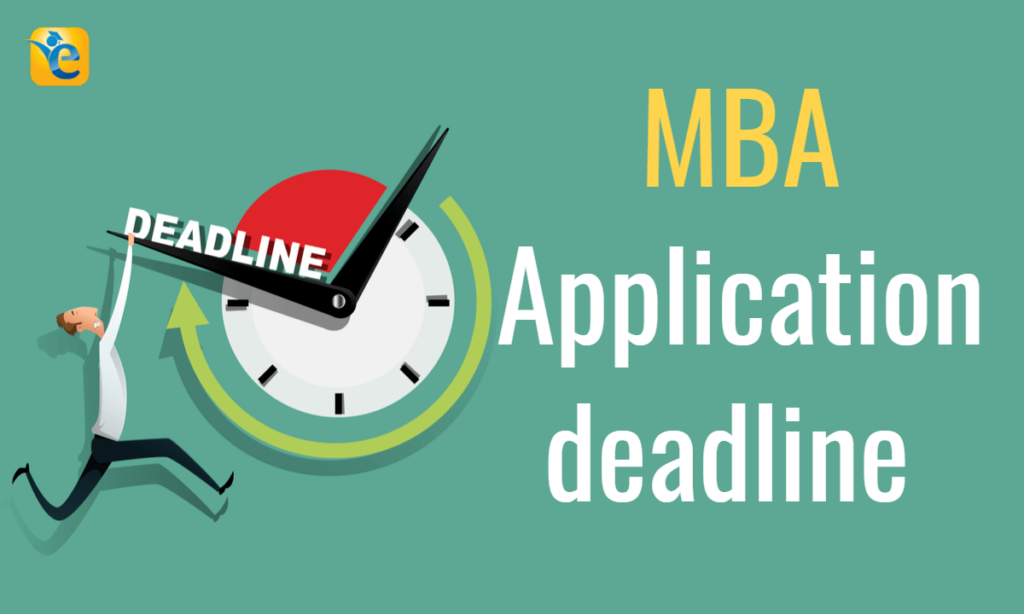
2024-25 MBA Admissions Deadlines
TOP US MBA PROGRAMS: Round 1, 2 & 3 Deadlines
| School | Round 1 | Round 2 | Round 3 | Round 4 | Decision Timeline |
| Harvard Business School | Sept 4, 2024 | Jan 6, 2025 | – | – | Dec 10, 2024 (R1), Mar 26, 2025 (R2) |
| Stanford GSB | Sept 10, 2024 | Jan 8, 2025 | Apr 8, 2025 | – | Dec 5, 2024 (R1), Apr 3, 2025 (R2), May 29, 2025 (R3) |
| UPenn Wharton | Sept 4, 2024 | Jan 3, 2025 | Apr 2, 2025 | – | Dec 10, 2024 (R1), Apr 1, 2025 (R2), May 13, 2025 (R3) |
| Chicago Booth | Sept 19, 2024 | Jan 7, 2025 | Apr 3, 2025 | – | Dec 5, 2024 (R1), Mar 27, 2025 (R2), May 22, 2025 (R3) |
| Northwestern Kellogg | Sept 11, 2024 | Jan 8, 2025 | Apr 2, 2025 | – | Dec 11, 2024 (R1), Mar 26, 2025 (R2), May 14, 2025 (R3) |
| MIT Sloan | Sept 30, 2024 | Jan 14, 2025 | Apr 7, 2025 | – | Dec 12, 2024 (R1), Apr 4, 2025 (R2), May 15, 2025 (R3) |
| Columbia CBS | ED: Sept 10, 2024 | Jan 7, 2025 | Apr 1, 2025 | – | Dec 20, 2024 (ED), Mar 26, 2025 (R1), May 15, 2025 (R2) |
| UC Berkeley Haas | Sept 12, 2024 | Jan 9, 2025 | Apr 3, 2025 | – | Dec 12, 2024 (R1), Mar 27, 2025 (R2), May 8, 2025 (R3) |
| Dartmouth Tuck | Sept 26, 2024 | Jan 6, 2025 | Mar 26, 2025 | – | Dec 12, 2024 (R1), Mar 13, 2025 (R2), May 1, 2025 (R3) |
| Yale SOM | Sept 10, 2024 | Jan 7, 2025 | Apr 8, 2025 | – | Dec 5, 2024 (R1), Mar 20, 2025 (R2), May 15, 2025 (R3) |
| Michigan Ross | Sept 9, 2024 | Jan 6, 2025 | Mar 24, 2025 | – | Dec 6, 2024 (R1), Mar 14, 2025 (R2), May 2, 2025 (R3) |
| UVA Darden | EA: Sept 5, 2024 | Oct 2, 2024 | Jan 7, 2025 | Apr 2, 2025 | Oct 16, 2024 (EA), Dec 11, 2024 (R1), Mar 12, 2025 (R2), Apr 30, 2025 (R3) |
| Duke Fuqua | EA: Sept 4, 2024 | Oct 1, 2024 | Jan 9, 2025 | Feb 20, 2025 | Oct 18, 2024 (EA), Dec 12, 2024 (R1), Mar 14, 2025 (R2), Apr 4, 2025 (R3) |
| NYU Stern | Sept 16, 2024 | Oct 16, 2024 | Jan 16, 2025 | Apr 16, 2025 | Dec 1, 2024 (R1), Jan 1, 2025 (R2), Apr 1, 2025 (R3), Rolling (R4) |
| Cornell Johnson | Sept 18, 2024 | Jan 9, 2025 | Apr 10, 2025 | – | Nov 1, 2024 (R1), Mar 14, 2025 (R2), May 16, 2025 (R3) |
| UCLA Anderson | Oct 1, 2024 | Jan 6, 2025 | Apr 14, 2025 | – | Dec 13, 2024 (R1), Mar 27, 2025 (R2), May 16, 2025 (R3) |
| Texas McCombs | Oct 15, 2024 | Jan 15, 2025 | Apr 1, 2025 | May 15, 2025 | Dec 17, 2024 (R1), Mar 27, 2025 (R2), Apr 29, 2025 (R3), Jun 5, 2025 (R4) |
| UNC Kenan-Flagler | Oct 8, 2024 | Jan 7, 2025 | Mar 4, 2025 | Apr 29, 2025 | Dec 11, 2024 (R1), Mar 19, 2025 (R2), Apr 23, 2025 (R3), May 28, 2025 (R4) |
| USC Marshall | Oct 1, 2024 | Jan 10, 2025 | Apr 15, 2025 | – | Dec 15, 2024 (R1), Apr 18, 2025 (R2), Jun 15, 2025 (R3) |
| CMU Tepper | Oct 1, 2024 | Jan 6, 2025 | Mar 3, 2025 | May 5, 2025 | Dec 4, 2024 (R1), Mar 5, 2025 (R2), Apr 23, 2025 (R3), Jun 4, 2025 (R4) |
Notes:
- Columbia’s August-entry Early Decision (ED) round is binding; subsequent rounds are rolling/regular.
- Duke Fuqua offers a binding Early Action (EA) round (shown as EA above)
When should you take the GMAT?
Finding an ideal test date that aligns with your preparation level and application deadlines can be equally daunting. To help you with this, we’ve created a quiz that will provide you with personalized recommendations on the best test date for you. Our quiz takes into account your current level of preparation and your target score to suggest the most suitable test date for you. So, take a few minutes to complete the quiz and gain valuable insights that will help you achieve success on the GMAT!
Top 10 European MBA Programs – Deadlines (2024-25)
| School | Round 1 | Round 2 | Round 3 | Round 4 | Decision Timeline |
| INSEAD (Aug 25 intake) | Sept 10, 2024 | Nov 5, 2024 | Jan 14, 2025 | Mar 4, 2025 | Nov 15, 2024 (R1), Jan 10, 2025 (R2), Mar 21, 2025 (R3), May 2, 2025 (R4) |
| INSEAD (Jan 26 intake) | Mar 11, 2025 | Apr 22, 2025 | Jun 17, 2025 | Aug 5, 2025 | May 16, 2025 (R1), Jul 4, 2025 (R2), Aug 22, 2025 (R3), Oct 10, 2025 (R4) |
| London Business School | Sept 6, 2024 | Jan 3, 2025 | Mar 24, 2025 | – | Nov 28, 2024 (R1), Mar 27, 2025 (R2), Jun 5, 2025 (R3) |
| IESE | Sept 26, 2024 | Jan 9, 2025 | Mar 20, 2025 | May 6, 2025 | Typically around Nov for R1, Mar for R2, May for R3, Jun for R4 |
| Oxford Saïd | Sept 2, 2024 | Oct 1, 2024 | Nov 1, 2024 | Jan 6, 2025 | Oct 11, 2024 (R1), Nov 8, 2024 (R2), Dec 13, 2024 (R3), Feb 28, 2025 (R4) |
| Cambridge Judge | Aug 27, 2024 | Oct 7, 2024 | Jan 6, 2025 | Mar 31, 2025 | Typically ~1 month post-interview |
| HEC Paris (Aug intake) | Aug 19, 2024 | Sept 16, 2024 | Oct 14, 2024 | Nov 12, 2024 | Sept 20, 2024 (R1), Oct 18, 2024 (R2), Nov 15, 2024 (R3), Dec 13, 2024 (R4) |
| SDA Bocconi | Rolling Admissions | – | – | – | Offers made in rounds until class is filled |
| IMD | Jun 15, 2024 | Aug 15, 2024 | Sep 15, 2024 | Oct 15, 2024 | Aug 1, 2024 (R1), Oct 1, 2024 (R2), Oct 18, 2024 (R3), Nov 8, 2024 (R4) |
| IE Business School | Rolling Admissions | – | – | – | Decisions typically 6-8 weeks after complete application |
| ESADE | Oct 3, 2024 | Nov 21, 2024 | Jan 14, 2025 | Feb 20, 2025 | Nov 20, 2024 (R1), Jan 13, 2025 (R2), Feb 19, 2025 (R3), May 19, 2025 (R4) |
Notes:
- Some schools like IE Business School and SDA Bocconi use rolling admissions rather than fixed rounds
- Many European programs offer early bird discounts or scholarship advantages for early applicants
- International applicants should generally aim for earlier rounds to allow sufficient time for visa processing
Top 5 Asian MBA Programs – Deadlines (2024-25)
| School | Round 1 | Round 2 | Round 3 | Round 4 | Decision Timeline |
| CEIBS | Rolling Admissions | – | – | – | Not specified |
| ISB | Sept 15, 2024 | Dec 8, 2024 | Jan 26, 2026 | – | Nov (R1), Feb (R2), Mar (R3) for 2023-24 cycle |
| NUS | Opens Aug 15, 2024 | Not specified | Not specified | – | Approximately two weeks after live interview |
| HKUST | Not specified | Not specified | Not specified | – | Rolling basis |
| NTU | Not available | – | – | – | Not available |
Take a free GMAT mock to understand your baseline score and start your GMAT prep with our free trial. We are the most reviewed online GMAT Prep company with 2600+ reviews on GMATClub.
Which Round Should You Apply For?

The decision between Round 1, 2, or 3 can significantly impact your MBA admission chances – possibly even more than the application itself. Many applicants agonize over this choice, wondering: “Should I rush to meet the Round 1 deadline with a good-but-not-great application, or polish everything for Round 2? Will applying in Round 3 doom my chances entirely?”
The pressure is real.
Choose too early, and you might submit before your profile is truly competitive.
Wait too long, and you could face severely diminished odds as seats fill up.
For international students, visa timelines add another layer of stress. For scholarship-dependent applicants, the financial stakes of round selection can translate to tens of thousands of dollars in potential aid.
In the sections below, you’ll get:
- School-specific acceptance rate patterns
- Strategic advantages of each round
- Insider guidelines that most applicants never consider- giving you the data-driven framework to make this critical decision with confidence rather than guesswork.
Acceptance Rates by Round: U.S. and European Programs
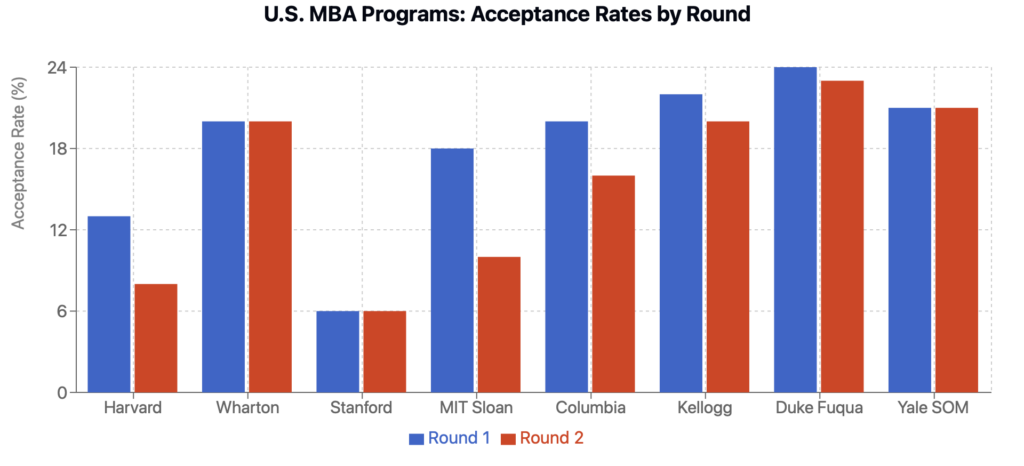
European Programs
INSEAD:
- Acceptance rates are generally consistent across rounds, but applying early can be beneficial for scholarships
London Business School:
- Specific round-by-round data is not readily available, but early applications are encouraged for better scholarship opportunities
Trends
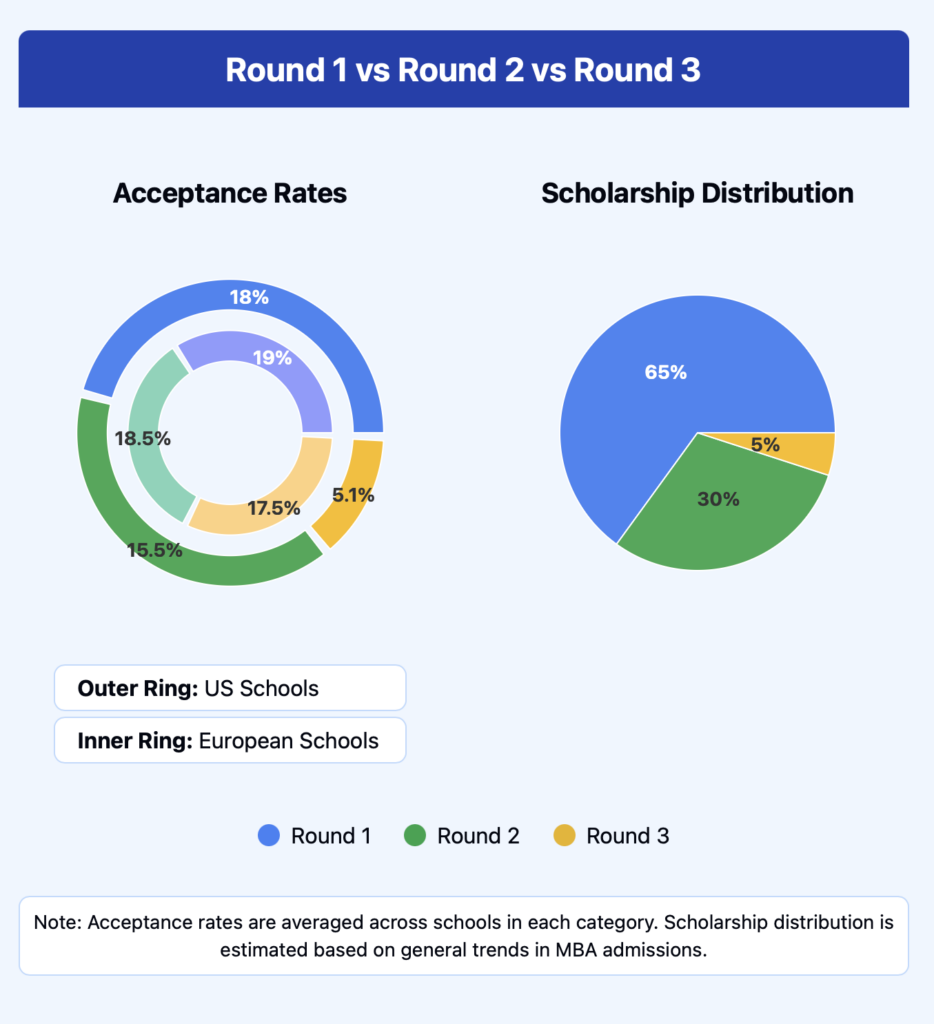
Pros and Cons of Each MBA Admission Round
| Round | Pros | Cons |
| Round 1 | ✔ All seats available ✔ Maximum scholarship opportunities ✔ Signals serious commitment ✔ December decisions allow time to adjust for R2 | ❗Early timeline requires complete package by September ❗Strong competition from well-prepared candidates and reapplicants |
| Round 2 | ✔ More time to improve applications ✔ Acceptance rates comparable to R1 for strong candidates | ❗Competing for fewer remaining seats ❗Highest volume of applicants ❗Limited options to apply elsewhere if rejected |
| Round 3/Round 4 | ✔ Can work for exceptional candidates with unique profiles ✔ Last chance without waiting another year | ❗Drastically lower acceptance rates (schools fill 90%+ by R2) ❗Limited scholarship funds remain ❗Schools only filling specific gaps Visa challenges for international students |
Which MBA Admission Round Is Right for You?
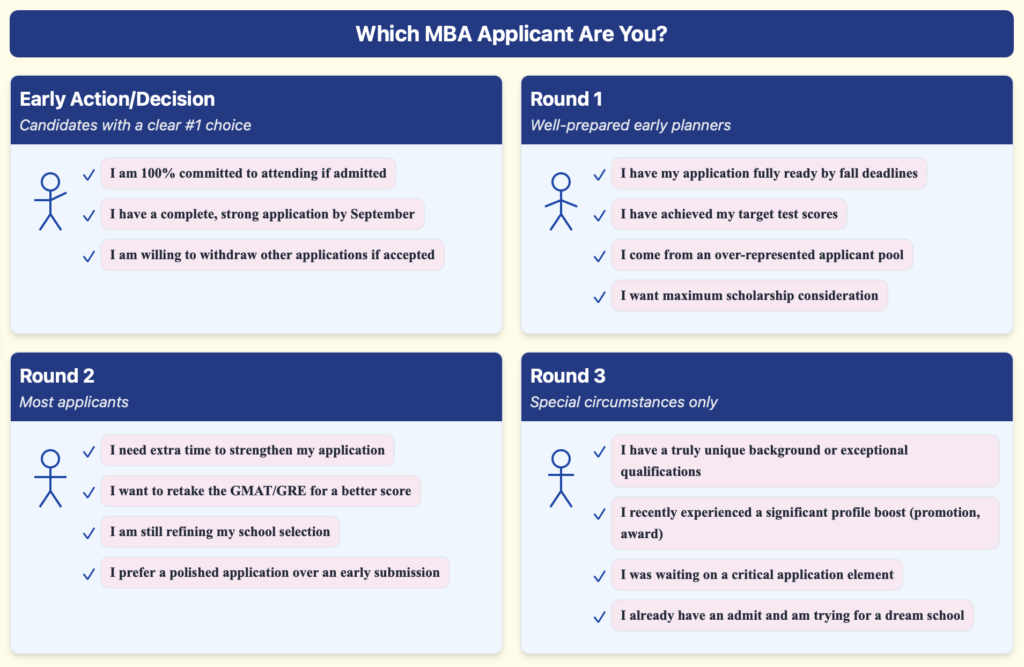
Key Takeaways for MBA Round Selection:
- Apply in the earliest round possible when your application is at its strongest
- Do not rush Round 1 with a weak GMAT score or unpolished essays
- Round 2 is better than a rushed Round 1 application
- Avoid Round 3 MBA deadlines unless you have a compelling reason or truly exceptional profile
- Consider later rounds only for backup options or unique circumstances
Understanding Rolling Admission for MBA Programs
Rolling admission offers a more flexible application approach compared to fixed rounds. With rolling admission, business schools evaluate applications as they arrive rather than waiting until a specific deadline. Programs like SDA Bocconi, IE Business School, and some Asian MBA programs utilize this system, reviewing candidates until all class spots are filled.
The key difference with rolling admission is that decisions are made continuously throughout the application cycle, often with shorter waiting periods between submission and decision. However, this doesn’t mean applicants should delay their submissions—applying early in a rolling cycle remains advantageous as both seats and scholarship funds may be allocated to early qualified applicants.
For any strategic advice for GMAT or MBA Admissions, write to us at acethegmat@e-gmat.com. Let us help you conquer the first step of getting into top business schools i.e., taking the GMAT. Take a free GMAT mock to understand your baseline score and start your GMAT prep with our free trial. We are the most reviewed online GMAT Prep company with 2600+ reviews on GMATClub.
Early Action vs. Regular Decision vs. Rolling Admissions
| Feature | Early Action/Decision | Regular Decision | Rolling Admissions |
| Timing | Summer/early fall deadlines | Fall (R1), winter (R2), spring (R3) | Continuous evaluation until seats fill |
| Commitment | Often binding (must attend if admitted) | No binding commitment | No binding commitment |
| Decision Speed | Accelerated (typically 6-8 weeks) | Standard (8-12 weeks) | Faster (typically 4-8 weeks) |
| Best For | Candidates with a clear #1 choice | Most applicants | Flexible timing needs |
| Ideal Candidate | 100% committed to one school | Comparing multiple programs | Those with evolving credentials |
Application Tips
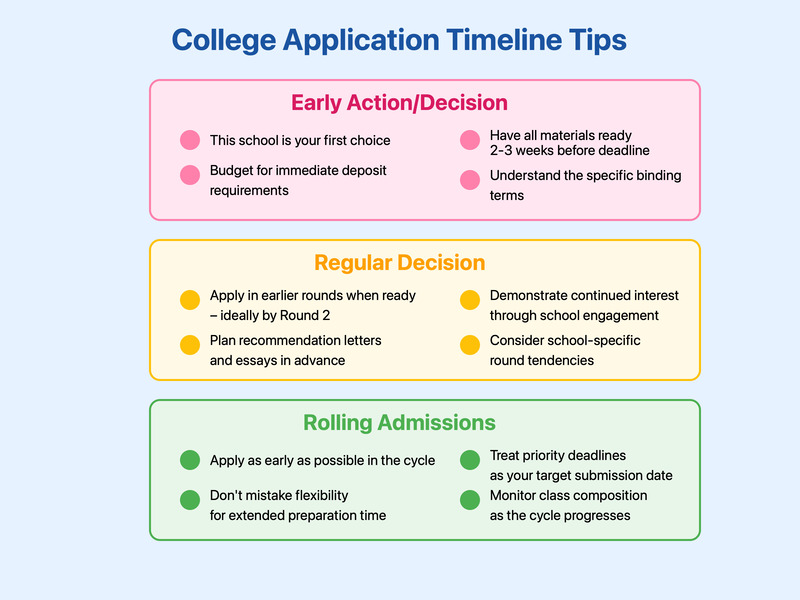
MBA Application Timeline: From Research to Admission
The MBA admission process requires careful planning and preparation. Following this MBA application timeline will help ensure you submit the strongest possible applications while avoiding last-minute stress.
Learn more about applying in Round 1 vs. Round 2
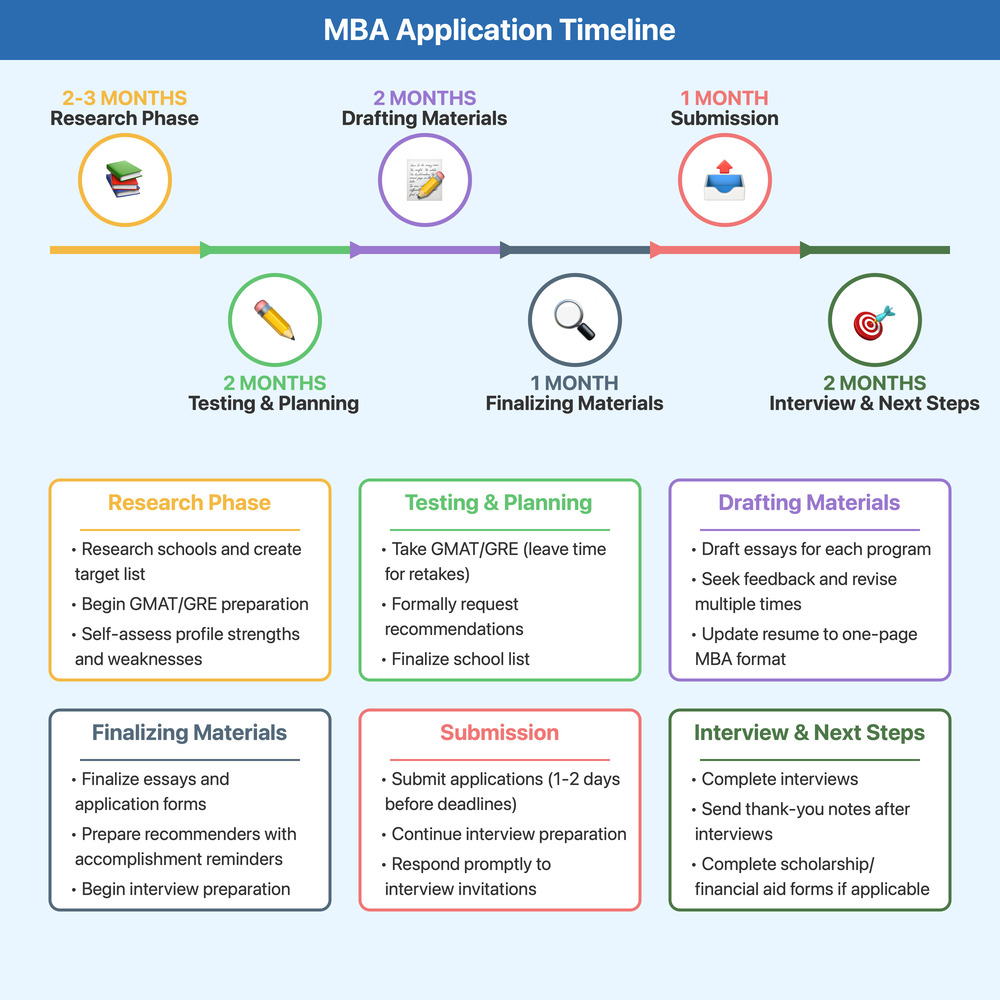
Learn more about how you can improve your MBA Applicant profile & boost your MBA Application. Your GMAT score has a 22% weightage in your MBA application, learn more about MBA application factors, in this article.
MBA Round 1 Deadlines: Critical First Phase
The MBA Round 1 deadlines generally fall between early September and early October. These represent the first opportunity to submit your application and typically offer advantages like full class availability and maximum scholarship consideration. For the 2024-25 cycle, most top US programs have their MBA Round 1 deadlines in September: Harvard (Sept 4), Stanford (Sept 10), Wharton (Sept 4), and Kellogg (Sept 11).
Preparing for MBA Round 1 deadlines requires starting your application process 9-12 months in advance. Candidates targeting these deadlines should have their standardized tests completed by July, essays drafted by early August, and all materials finalized by late August.
MBA Round 2 Deadlines: The Peak Application Phase
The MBA Round 2 deadlines occur in January for most programs and represent the most popular application window. For 2025 admission, key MBA Round 2 deadlines include Harvard (Jan 6), Stanford (Jan 8), Wharton (Jan 3), and Chicago Booth (Jan 7).
While MBA Round 2 deadlines offer more preparation time, they also feature the highest application volume. Candidates targeting Round 2 should still complete standardized tests by November, begin essays in October, and finalize all materials by late December.
Round 3 MBA Deadlines: Final Opportunities
The Round 3 MBA deadlines represent the final application opportunity for most programs, typically falling in April. For the 2024-25 cycle, notable Round 3 MBA deadlines include Stanford (Apr 8), Wharton (Apr 2), and MIT Sloan (Apr 7).
Application success rates for Round 3 MBA deadlines are significantly lower at top programs as most seats are already filled. These deadlines are best suited for exceptional candidates or those targeting programs ranked 10-25, which often maintain reasonable acceptance rates even in later rounds.
Estimated Time Requirements for MBA Application Components
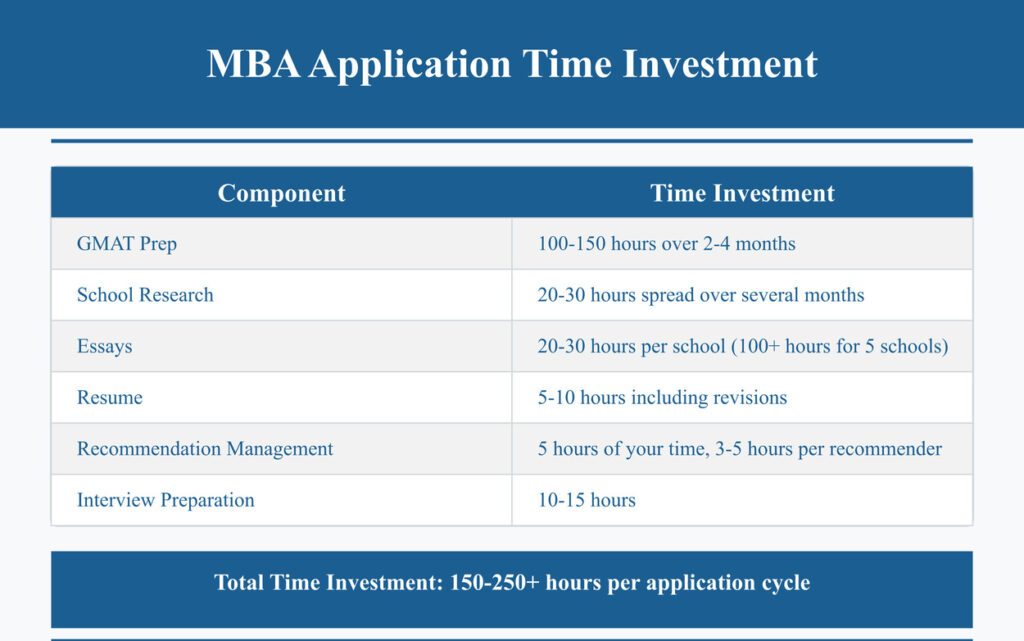
Final Thoughts: Navigating Your MBA Admissions Journey
Successfully managing MBA admissions deadlines requires strategic planning, thorough preparation, and a clear understanding of how each application round affects your chances. By following the comprehensive timeline and round-specific guidance in this guide, you’ll position yourself for maximum impact in the highly competitive MBA admission landscape.
Remember that while MBA admissions deadlines create structure for the application process, your focus should remain on application quality rather than simply meeting the earliest possible deadline.
MBA Admissions FAQs: Expert Answers to Your Application Questions
MBA applications for Fall 2025 typically open in July-August 2024 for most top business schools. Harvard, Stanford, and Wharton generally make their applications available by early August, while some European programs like INSEAD may open applications even earlier. Schools with rolling admissions may accept applications as early as June 2024 for the 2025 intake.
The best round to apply for an MBA depends on your application readiness and profile strength. Round 1 offers advantages like full seat availability and maximum scholarship consideration, while Round 2 allows more preparation time. For most applicants, the best strategy is applying in the earliest round when your application is fully optimized rather than rushing an incomplete application.
For top MBA programs, September and January are the primary application months, corresponding to Round 1 and Round 2 deadlines respectively. September applications (Round 1) offer full seat availability and scholarship consideration, while January submissions (Round 2) allow more preparation time. Early Decision/Action applications typically fall in September, while Round 3 applications occur in March-April, though these are generally less advantageous.
The MBA admissions process typically starts 12-14 months before your intended enrollment date. For Fall 2025 entry, the admissions cycle begins in summer 2024 when applications open, though preparation should start much earlier. Most applicants begin GMAT/GRE preparation and school research in January-March 2024, approximately 18-20 months before enrollment, to ensure adequate preparation time.
The MBA admission process involves multiple sequential steps: researching schools (January-March), GMAT/GRE preparation (January-May), finalizing school selections (April-May), requesting recommendations (May), drafting essays (June-July), completing applications (August), submitting by deadlines (September-January), interviewing (October-February), and receiving decisions (December-March). The entire process typically spans 9-12 months from initial preparation to final decisions.


